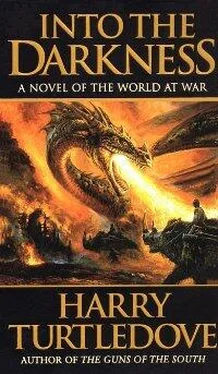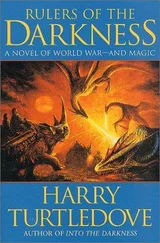“When all is in readiness,” Marstalu answered easily. That might mean anything. It might mean nothing. Skarnu suspected it meant nothing here. The duke went on, “Perhaps we could be more zealous now had we reached this position before the Algarvians finished their dismantling of Forthweg.”
Skarnu didn’t know what to say to that. Marstalu was saying the same thing he had to Raunu. Raunu hadn’t thought it would make a difference. Skarnu had to hope the sergeant was right and he and the commander of the army wrong. But, had the Duke of Klaipeda wanted to reach the fortified belt before Forthweg collapsed, he should have pushed harder. He could have. Of course, he couldn’t have known Algarve’s attack would shatter Forthweg, but everything Skarnu had ever soaked up about the military art suggested that wasting time was never a good idea.
Pushing Marstalu further would accomplish nothing but getting him on the commander’s black list. He could see as much at a glance. That being so, what better choice than enjoying the choice viands and potables set out on the tables before him? He sat down between a pair of bemedaled colonels. One of them jabbed a serving fork into the large, savory bird lying on a tray in front of him. Juices spurted. “Have some, Captain,” he said. “As you can see, we’ve finally gone and cooked Algarve’s goose.”
The colonel on the other side of Skarnu laughed so uproariously at that sally, Skarnu was convinced he’d already emptied the crystal goblet before him several times. Lifting his own wine goblet, Skarnu said, “May we serve the king as we have served the goose.”
“Oh, well said, young fellow, well said,” both colonels exclaimed in the same breath. They drank. So did Skarnu. He carved off a thick slice of goose, then spooned a good helping of parsnips seethed in cream and dotted with butter on to his plate. The salad was of fine lettuces and chopped scallions dressed with wine vinegar and walnut oil.
One of the colonels boasted about the speed of the fine horses he had liberated from an Algarvian noble’s stables. The other boasted about the agility of the fine mistress he had liberated from an Algarvian noble’s bedchamber. Skarnu tried to boast about the fighting qualities of the men in his company. Neither colonel seemed the least bit interested. They were fascinated with each other’s brags, though. Sometimes it was hard to tell which one was talking about his new acquisition.
Gloom settled over Skarnu like a winter fog in Priekule. King Gainibu had been more interested in starting the war against Algarve than his officers were in fighting it. They’d taken what the Algarvians were willing to yield. Now that the Algarvians had yielded everything up to their long-established defensive line, they weren’t going to be willing to yield any more. And going up against that line was, ever more plainly, the last thing any Valmieran commander wanted to do.
One of the boastful colonels upended his goblet once too often. He set his head down on the table and started to snore. Skarnu felt like getting that drunk, too. Why not? he thought. Raunu runs the company just as well when I’m not there.
In the end, though, he refrained. He started to make his way over to the Duke of Klaipeda to say his farewells, but Marstalu seemed far gone in wine himself. Skarnu slipped out into the cool, dark night and headed east toward his company. All things considered, he would rather not have been invited to the feast. He’d hoped for reassurance. What he’d got was more to worry about.
Fernao strolled through the streets of Setubal, delighting in the life that brawled around him. The capital of Lagoas had long been the most cosmopolitan city in the world. Now, the mage thought sadly, it was, as near as made no difference, the only cosmopolitan city left in the world.
Lagoas was not at war with anyone. That made the island kingdom unique among the major powers. Oh, Unkerlant was not at war with anyone at the moment, but Fernao, along with everyone else, assumed that was only because King Swemmel, having helped himself to a large chunk of Forthweg, was looking around for his next neighbor to assault. Zuwayza affronted him merely by existing, as Forthweg had, but Yanina had taken in King Penda when he fled Eoforwic. One of them would go under soon. Maybe both of them would go under soon. Fernao guessed Yanina would go first.
But Lagoas, with any luck at all, could stay neutral through the whole mad war. Fernao hoped his kingdom could. Monuments in Setubal’s many parks and at street corners warned of wars past: recent monuments to the fight against Algarve in the Six Years’ War, older ones to war against Valmiera, older ones still to wars against Kuusamo and the pirates of Sibiu who were all the rage in Lagoan romances these days, even a couple of Kaunian columns from the days before the Empire brought its armies back home to the mainland of Derlavai.
What sort of monument might a kingdom erect to a war in which it hadn’t fought? Fernao visualized a marble statue, three times life size, of a man swiping the back of his hand across his forehead in relief. After a moment, he realized the man he’d visualized looked a lot like him. He laughed at that. He’d known he was vain. Maybe he hadn’t known how vain he was.
He turned into a tavern (a good piece of magecraft, that, he thought, now with a laugh that was more like a snort) and ordered a glass of Jelgavan red wine. When the taverner gave it to him, he took it over to a small table by the wall and sipped in leisurely fashion. The taverner gave him a sour look, as he might have done with any man likely to occupy space without bringing in much business.
Plenty of other people were drinking more than Fernao: Lagoans, slant-eyed Kuusamans, Valmierans in trousers, Sibians, even a few Algarvians who’d managed to run their foes’ blockade. The mage wondered what sort of shady deals they were cooking up. Since everyone could come to Setubal, anything was liable to happen here. He knew that very well.
Along with noting the conversation humming around him, he listened with a different part of his being to the power humming through Setubal. There were more power points in a smaller space here than anywhere else in the world; more ley lines converged on the Lagoan capital than on any other city. In a mage’s veins, the song of that power sometimes seemed stronger than his pulse.
A man slid down on to the ladderbacked chair across the table from Fernao. “Mind if I join you?” he asked with a friendly smile.
“It’s all right,” Fernao answered. He would sooner have been alone with his thoughts, but the tavern was crowded. He lifted his wineglass. “Your good health.”
“I thank you, sir. And yours.” The stranger lifted his mug in return. Steam and a sweet, spicy smell rose from it: hot mulled cider in there, unless Fernao’s nose had lost its cleverness. The stranger sipped, then nodded with the air of a connoisseur. “Powers above, that’s good,” he said.
Fernao nodded, politely but without intending to encourage further conversation. But, as he drank a little more wine, he could not help starting to size up the man across from him. And, once he’d started, he found he couldn’t stop. The fellow spoke unaccented Lagoan, but he didn’t look like a native of King Vitor’s domain. Lagoans were more various in their appearance than the folk of many kingdoms—Fernao’s slanted eyes said as much—but very few were dark and stocky and heavily bearded.
Even fewer wore trousers. That was a Kaunian fashion no kingdom sprung from Algarvic stock had ever adopted. Taken all in all, the stranger might have been put together out of pieces from three or four different puzzles.
Читать дальше












